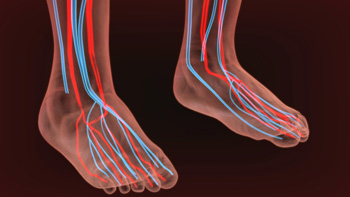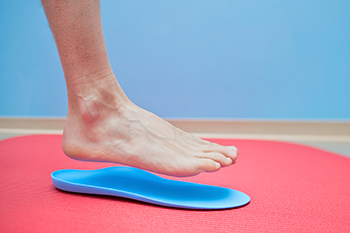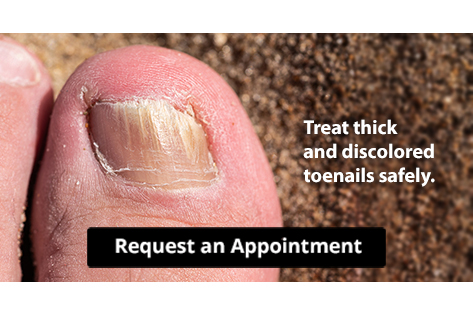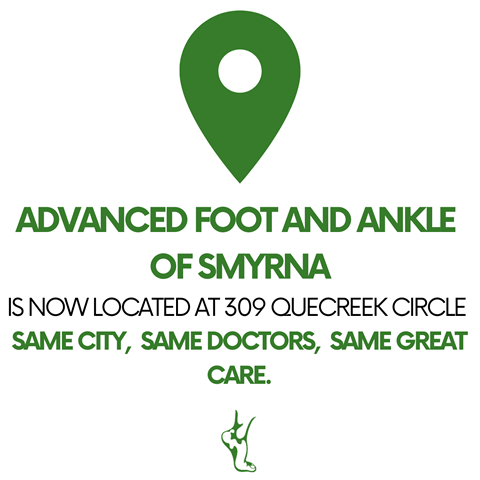Items filtered by date: July 2023
The Feet Can Be Affected by Poor Circulation

Symptoms that are associated with poor circulation can include cold or discolored feet, and there may be numbness or a tingling sensation. Poor circulation can come from closed, hardened, or narrowed blood vessels that can prevent adequate blood, oxygen, and nutrients from being transported through the body. There may be underlying reasons that can lead to poor circulation. These can include Raynaud’s disease, which can limit blood flow to the fingers and toes, and acrocyanosis, causing the toes to turn blue from constricting blood vessels. Additionally, poor circulation is common among diabetic patients as a result of damaged blood vessels. Poor circulation may also affect people who smoke, are inactive, or who have high cholesterol or blood pressure. Mild relief may be found when the feet are massaged, relaxation techniques are practiced, and physical activity is increased. If you have symptoms of poor circulation, it is suggested that you confer with a podiatrist who can offer you the correct treatment options.
While poor circulation itself isn’t a condition; it is a symptom of another underlying health condition you may have. If you have any concerns with poor circulation in your feet contact one of our podiatrists of Advanced Foot & Ankle Care Centers. Our doctors will treat your foot and ankle needs.
Poor Circulation in the Feet
Peripheral artery disease (PAD) can potentially lead to poor circulation in the lower extremities. PAD is a condition that causes the blood vessels and arteries to narrow. In a linked condition called atherosclerosis, the arteries stiffen up due to a buildup of plaque in the arteries and blood vessels. These two conditions can cause a decrease in the amount of blood that flows to your extremities, therefore resulting in pain.
Symptoms
Some of the most common symptoms of poor circulation are:
- Numbness
- Tingling
- Throbbing or stinging pain in limbs
- Pain
- Muscle Cramps
Treatment for poor circulation often depends on the underlying condition that causes it. Methods for treatment may include insulin for diabetes, special exercise programs, surgery for varicose veins, or compression socks for swollen legs.
As always, see a podiatrist as he or she will assist in finding a regimen that suits you. A podiatrist can also prescribe you any needed medication.
If you have any questions, please feel free to contact our offices located in Nashville, Smyrna, Spring Hill, Columbia, Dickson, Fairview, Hohenwald, TN and the Middle Tennessee community . We offer the newest diagnostic and treatment technologies for all your foot care needs.
Wearing Orthotics May Help Certain Foot Conditions

There are specific foot conditions that may require patients to wear orthotics. They can range from having flat feet to other abnormal foot structures. Orthotics are defined as custom-made inserts for shoes and are designed to correct certain foot ailments. Having foot or heel pain may guide a patient toward inquiring about orthotics, and this information is often provided by a podiatrist. This type of doctor will perform a foot examination that can reveal existing deformities. This can be followed by having a conversation about current activities that are performed, which may help to determine the cause of the pain. Medical conditions that may improve by wearing orthotics can include arthritis, bunions, flat feet, and hammertoe. There are various types of orthotics that can be worn, and it is suggested that you confer with a podiatrist who can determine if this is the best course of treatment for you.
If you are having discomfort in your feet and would like to try orthotics, contact one of our podiatrists from Advanced Foot & Ankle Care Centers. Our doctors can provide the care you need to keep you pain-free and on your feet.
What Are Orthotics?
Orthotics are inserts you can place into your shoes to help with a variety of foot problems such as flat feet or foot pain. Orthotics provide relief and comfort for minor foot and heel pain but can’t correct serious biomechanical problems in your feet.
Over-the-Counter Inserts
Orthotics come in a wide variety of over-the-counter inserts that are used to treat foot pain, heel pain, and minor problems. For example, arch supports can be inserted into your shoes to help correct overarched or flat feet, while gel insoles are often used because they provide comfort and relief from foot and heel pain by alleviating pressure.
Prescription Orthotics
If over-the-counter inserts don’t work for you or if you have a more severe foot concern, it is possible to have your podiatrist prescribe custom orthotics. These high-quality inserts are designed to treat problems such as abnormal motion, plantar fasciitis, and severe forms of heel pain. They can even be used to help patients suffering from diabetes by treating foot ulcers and painful calluses and are usually molded to your feet individually, which allows them to provide full support and comfort.
If you are experiencing minor to severe foot or heel pain, it’s recommended to speak with your podiatrist about the possibilities of using orthotics. A podiatrist can determine which type of orthotic is right for you and allow you to take the first steps towards being pain-free.
If you have any questions please contact our offices located in Nashville, Smyrna, Spring Hill, Columbia, Dickson, Fairview, Hohenwald, TN and the Middle Tennessee community . We offer the newest diagnostic and treatment technologies for all your foot and ankle needs.
Stop Your Toenail Fungus
How Do Heel Fissures Differ From Cracked Heels?

Heel fissures are cracks or breaks in the skin of the heels and usually form from intense dryness and thickened skin. These cracks can be superficial or deep, and they may bleed or feel painful. Heel fissures may worsen and become infected or turn into skin ulcers, and it is important to treat them to prevent this from happening. There may be underlying conditions that can lead to heel fissures, which can include, but are not limited to, nutritional deficiencies that can cause the skin to lose moisture, and skin ailments that result in inflammation, itching and dryness. Additionally, cracked heels may happen as a result of wearing footwear that does not allow the feet to breathe. People who have diabetes are at risk for nerve damage to the feet, which is referred to as peripheral neuropathy. One of the several problems this can create can affect the nerves on the feet. Sweating may be reduced or stopped, possibly causing a dry environment for skin fissures to develop. If you are experiencing heel fissures, it is strongly suggested that you seek the care of a podiatrist who can determine what the cause is, and offer correct treatment methods.
If the skin on your feet starts to crack, you may want to see a podiatrist to find treatment. If you have any concerns, contact one of our podiatrists from Advanced Foot & Ankle Care Centers. Our doctors can provide the care you need to keep you pain-free and on your feet.
Cracked Heels
It is important to moisturize your cracked heels in order to prevent pain, bleeding, and infection. The reason cracked heels form is because the skin on the foot is too dry to support the immense pressure placed on them. When the foot expands, the dry skin on the foot begins to split.
Ways to Help Heal Them
- Invest in a good foot cream
- Try Using Petroleum Jelly
- Ease up on Soaps
- Drink Plenty of Water
Ways to Prevent Cracked Heels
- Moisturize After Showering
- Skip a Shower
- Keep Shower Water Lukewarm
- Don’t Scrub Your Feet
If you are unsure how to proceed in treating cracked heels, seek guidance from a podiatrist. Your doctor will help you with any questions or information you may need.
If you have any questions, please feel free to contact our offices located in Nashville, Smyrna, Spring Hill, Columbia, Dickson, Fairview, Hohenwald, TN and the Middle Tennessee community . We offer the newest diagnostic and treatment technologies for all your foot care needs.



